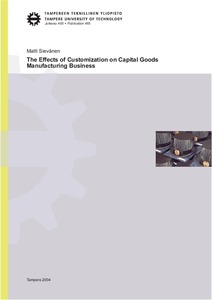The Effects of Customization on Capital Goods Manufacturing Business
Sievänen, M. (2004)
Sievänen, M.
Tampere University of Technology
2004
Konetekniikan osasto - Department of Mechanical Engineering
This publication is copyrighted. You may download, display and print it for Your own personal use. Commercial use is prohibited.
Julkaisun pysyvä osoite on
https://urn.fi/URN:NBN:fi:tty-200810021088
https://urn.fi/URN:NBN:fi:tty-200810021088
Tiivistelmä
Customization has gained much attention during the past decade. In the capital goods industry, customization has always been the dominant paradigm. Capital goods, such as big luxury cruisers, have not only been custom built but even custom designed. However, capital goods manufacturers have been seeking volume-related advantages by standardizing products. Although they have succeeded somewhat in standardizing most of their production, they still manufacture many customized products. Indeed, even so-called standard products are often customized using standard options, with any two of the same standard products quite seldom being alike. This thesis focuses on those products having both standard and customized versions, as well as annual production volumes ranging between ten and several hundred units.
This research studies the effects of customization on capital goods manufacturing in terms of company operations and the extra costs resulting from customization. Compared to previous studies, this thesis takes a broader view of customization by combining sales, engineering, manufacturing, and after sales. Furthermore, the focus on after sales extends the time perspective of this view. The thesis relies on five different case studies, conducted in four companies, all of which manufacture capital goods for industrial customers. Two of these companies are more closely studied to gain a more detailed view of the distinct effects of customization. Studying customization in the capital goods manufacturing industry extends current theory concerning customization, since most of the research has primarily focused on the consumer goods environment.
The thesis shows that customization is a normal procedure in capital goods manufacturing. It is used to avoid price competition and can be seen as a way to justify operating in the markets. Customization has the greatest effect on engineering, while tied-up resources form an important disadvantage. In manufacturing, this disadvantage is perceived as increasing throughput time and thus leading companies to begin manufacturing before determining all customer specifications. However, in terms of after sales the effects are quite minor, because after sales in capital goods is already a low-volume business, which is not significantly lowered by customization. Nevertheless, though after sales is low-volume business, it still has important economic value.
Keywords: Capital goods, Customization, Management accounting, Product variety
This research studies the effects of customization on capital goods manufacturing in terms of company operations and the extra costs resulting from customization. Compared to previous studies, this thesis takes a broader view of customization by combining sales, engineering, manufacturing, and after sales. Furthermore, the focus on after sales extends the time perspective of this view. The thesis relies on five different case studies, conducted in four companies, all of which manufacture capital goods for industrial customers. Two of these companies are more closely studied to gain a more detailed view of the distinct effects of customization. Studying customization in the capital goods manufacturing industry extends current theory concerning customization, since most of the research has primarily focused on the consumer goods environment.
The thesis shows that customization is a normal procedure in capital goods manufacturing. It is used to avoid price competition and can be seen as a way to justify operating in the markets. Customization has the greatest effect on engineering, while tied-up resources form an important disadvantage. In manufacturing, this disadvantage is perceived as increasing throughput time and thus leading companies to begin manufacturing before determining all customer specifications. However, in terms of after sales the effects are quite minor, because after sales in capital goods is already a low-volume business, which is not significantly lowered by customization. Nevertheless, though after sales is low-volume business, it still has important economic value.
Keywords: Capital goods, Customization, Management accounting, Product variety
Kokoelmat
- Väitöskirjat [4768]
